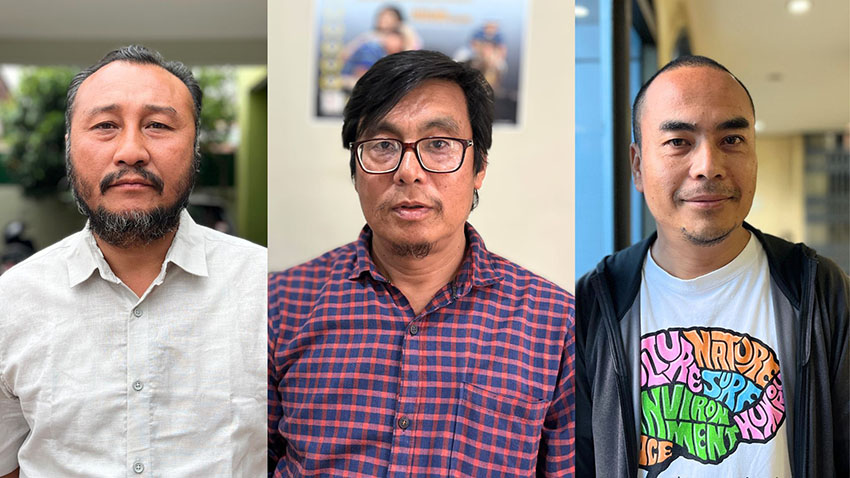In a society like Manipur, where silence around gender and sexuality still cloaks everyday conversations, ONENESS doesn’t just break the silence—it shatters it with grace, empathy, and unflinching honesty. Written, directed, edited, sound-designed, produced, and headlined by Priyakanta Laishram, alongside producer Roushil Singla, the film is a rare act of courage and conviction. Together, they have backed a project that not only challenges conventional cinematic narratives but also confronts the deeply rooted cultural intolerance that continues to plague society.
Set against the socio-political landscape of Northeast India—a region already marked by ethnic, cultural, and political complexity—ONENESS pierces through the layered silences around same-sex relationships. The film does not sensationalize or dramatize queerness; rather, it roots its narrative in lived experiences, quiet suffering, and subtle resistance. By doing so, it becomes a vital document of socio-cultural introspection. What makes ONENESS especially relevant in today’s socio-economic climate is its interrogation of systemic intolerance not as isolated incidents but as a continuum that permeates family structures, religious dogmas, and even personal friendships.

Laishram’s choice to base the film on a real-life tragic incident adds an undeniable weight to its storytelling. The fact that the film is inspired by an actual event makes the issue it tackles even more concerning, as it highlights the harsh reality faced by many individuals in similar situations. The tragic loss of life, driven by the very social forces the film critiques, underscores the urgency of these conversations. In a society where queer individuals are often forced into silence, exile, or even death, the film brings forth a haunting truth: intolerance is not always loud; sometimes, it is insidious, polite, and hidden in the folds of tradition and “normalcy.”
The artistic choices in ONENESS are understated yet powerful. The film’s use of natural light complements its visual style, and the color palette—bluish with touches of pink and red—adds an emotional depth that elevates the narrative. The cool tones represent the emotional isolation and suppression that Ivan feels, while the warmer hues subtly hint at his desire for connection and love, creating a stark contrast between societal rejection and personal longing. This color palette speaks to the internal conflict of the characters, making the narrative feel even more intimate and raw.
Laishram’s direction doesn’t preach. Instead, it observes. It lingers on the quiet pain of rejection, the desperation of concealment, and the resilience required to simply exist. What truly stands out is the emotionally charged screenplay and direction by Priyakanta Laishram that never ceases to lose its grip on the narrative. Equally powerful is the immersive, raw sound design by Laishram himself, which adds a visceral dimension to the storytelling, making every scene feel immediate and real. The film’s background score, composed by Whitesand Music, S. Buckley, and Noel Malekar, is a powerful emotional force in itself. Malekar’s choir-infused compositions, in particular, stand out for their haunting beauty and spiritual depth. The cinematography by Boong Konjengbam and Ibomcha Irom is commendable. Their use of intimate close-up shots draws viewers into the psychological and emotional core of the characters, particularly Ivan.
The film’s impact is elevated by its stellar cast. Priyakanta Laishram delivers the best performance of the film as Ivan Martin—raw, aching, and profoundly real. His portrayal becomes the soul of the narrative, etching every moment of Ivan’s trauma and truth with remarkable subtlety. Maya Choudhury, in perhaps the finest performance of her illustrious career, stuns as Anna Martin, Ivan’s conflicted and emotionally torn mother. Sachinker Sagolsem and Suraj Ngashepam deliver their career-best portrayals as Ivan’s brother Daniel and boyfriend Pamheiba, respectively, imbuing their roles with rare nuance. Harendra Laishram as Peter Martin and Ramva Leishangthem as Mersia Martin also shine with deeply felt performances.
Produced under Priyakanta Productions, ONENESS is one in a million—it needs to stay, be seen, and be celebrated. Rather than trolling or bashing it—as sadly witnessed in Manipur before its release following actress Maya Choudhury’s casual remark in a promotional interview —people must recognize the courage it takes to make a film that truly matters. The bans, threats, and emotional torment inflicted upon Priyakanta Laishram only underline how urgently such truthful cinema is needed. ONENESS is not just a film—it’s a cultural awakening.
Had Manipur been less restrictive and dictating in terms of creative liberty, one feels that filmmaker Priyakanta Laishram could have explored even more depth within the story and screenplay. The absence of more scenes depicting the romantic development and emotional intimacy between Ivan and Pamheiba feels like a missed opportunity—not by choice, but by constraint. In many other Indian states or countries, such portrayals are embraced, adding richness and emotional layers. But what to do! In Manipur, creative freedom and artistic liberty have always been cut short, censored, or sidelined.
Yet, kudos to Priyakanta Laishram for daring to make a film like ONENESS—the first of its kind in more than 50 years of Manipuri cinema—despite the threats, bans, and relentless opposition. His courage has not just created a cinematic milestone but opened the door for others to follow.












